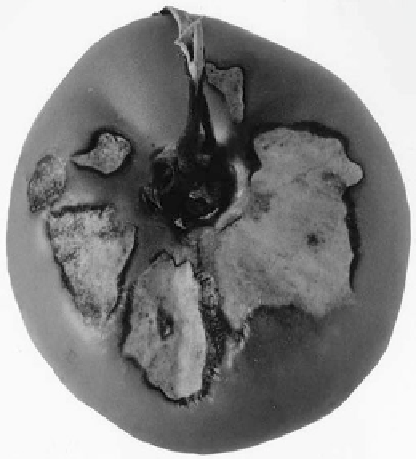Biology Reference
In-Depth Information
Sulfur Injury
Sulfur sprays and dusts are likely to burn foliage
in hot weather, when temperature is much over
85
F. There is often a browning of tip or margin
of leaves. Lime sulfur is injurious to some plants
in any weather, russeting peach foliage, causing
apple drop, etc. When roses or other plants are
continuously dusted with sulfur over a period of
years, the soil may become too acid and require
lime as a corrective.
Sunscald
Trees with smooth bark are subject to sunscald
when trunks or branches are suddenly exposed to
the sun, as when the next tree is removed. Young
trees are subject to sunscald the first year or two
after planting and should have trunks wrapped in
burlap or sprayed with a protective wax to prevent
the cambium under the thin bark from drying out.
Boxwood foliage is subject to sunscald in
spring after winter covering is removed, particu-
larly if this is done on a sunny day with drying
winds. Sunscald is common on green tomatoes
when fruits are exposed to sun in hot dry weather
(
Fig. 6
). This happens when foliage is lost through
disease or excessive irrigation, or when too much
is removed in training tomatoes to a single stem.
A yellow or white patch appears on the side of the
tomato nearest the sun, often developing into
a blister, then into a large, flattened spot with
a papery white surface darkened by the growth of
secondary fungi and internal decay.
Fig. 6
Tomato Sunscald
marginal browning of leaves and small brown or
black spots in tissues near larger veins. A regular
supply of moisture and avoidance of excessive
fertilization in warm weather reduce tipburn, but
more reliance should be placed on growing vari-
eties resistant to summer heat.
Topple
Topple, of gladiolus. Toppling over is apparently
due to calcium deficiency; reduced by a spray of
2 % calcium nitrate.
Variegation
Chlorophyll deficiency, genetic factors, and virus
diseases can produce variegated plants.
Sunstroke
Outright killing in excessive heat.
Water Deficiency
Tipburn
Practically all of the injury laid to excessive heat
or cold is basically due to lack of water. Winter
winds and summer sun evaporate it from cells
faster than it can be replaced from roots, so that
the cells collapse and die.
Potassium deficiency may produce a tipburn, but
more often this is a reaction to heat, common in
potatoes and particularly in lettuce, which shows









